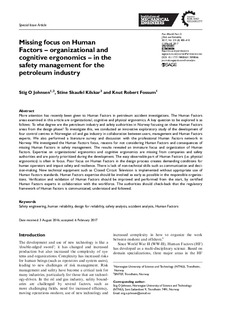| dc.contributor.author | Johnsen, Stig Ole | |
| dc.contributor.author | Kilskar, Stine Skaufel | |
| dc.contributor.author | Fossum, Knut Robert | |
| dc.date.accessioned | 2017-11-24T09:11:52Z | |
| dc.date.available | 2017-11-24T09:11:52Z | |
| dc.date.created | 2017-11-21T10:34:44Z | |
| dc.date.issued | 2017 | |
| dc.identifier.citation | Proceedings of the Institution of Mechanical Engineers. Part O, Journal of risk and reliability. 2017, 231 (4), 400-410. | nb_NO |
| dc.identifier.issn | 1748-006X | |
| dc.identifier.uri | http://hdl.handle.net/11250/2467950 | |
| dc.description.abstract | More attention has recently been given to Human Factors in petroleum accident investigations. The Human Factors areas examined in this article are organizational, cognitive and physical ergonomics. A key question to be explored is as follows: To what degree are the petroleum industry and safety authorities in Norway focusing on these Human Factors areas from the design phase? To investigate this, we conducted an innovative exploratory study of the development of four control centres in Norwegian oil and gas industry in collaboration between users, management and Human Factors experts. We also performed a literature survey and discussion with the professional Human Factors network in Norway. We investigated the Human Factors focus, reasons for not considering Human Factors and consequences of missing Human Factors in safety management. The results revealed an immature focus and organization of Human Factors. Expertise on organizational ergonomics and cognitive ergonomics are missing from companies and safety authorities and are poorly prioritized during the development. The easy observable part of Human Factors (i.e. physical ergonomics) is often in focus. Poor focus on Human Factors in the design process creates demanding conditions for human operators and impact safety and resilience. There is lack of non-technical skills such as communication and decision-making. New technical equipment such as Closed Circuit Television is implemented without appropriate use of Human Factors standards. Human Factors expertise should be involved as early as possible in the responsible organizations. Verification and validation of Human Factors should be improved and performed from the start, by certified Human Factors experts in collaboration with the workforce. The authorities should check-back that the regulatory framework of Human Factors is communicated, understood and followed. | nb_NO |
| dc.language.iso | eng | nb_NO |
| dc.publisher | SAGE Publications | nb_NO |
| dc.rights | Navngivelse-Ikkekommersiell 4.0 Internasjonal | * |
| dc.rights.uri | http://creativecommons.org/licenses/by-nc/4.0/deed.no | * |
| dc.title | Missing focus on Human Factors – organizational and cognitive ergonomics – in the safety management for the petroleum industry | nb_NO |
| dc.type | Journal article | nb_NO |
| dc.type | Peer reviewed | nb_NO |
| dc.description.version | publishedVersion | nb_NO |
| dc.source.pagenumber | 400-410 | nb_NO |
| dc.source.volume | 231 | nb_NO |
| dc.source.journal | Proceedings of the Institution of Mechanical Engineers. Part O, Journal of risk and reliability | nb_NO |
| dc.source.issue | 4 | nb_NO |
| dc.identifier.doi | 10.1177/1748006X17698066 | |
| dc.identifier.cristin | 1516504 | |
| dc.relation.project | Norges forskningsråd: 267509 | nb_NO |
| dc.description.localcode | © 2017 The Authors. This article is distributed under the terms of the Creative Commons Attribution-NonCommercial 4.0 License (http://www.creativecommons.org/licenses/by-nc/4.0/) | nb_NO |
| cristin.unitcode | 194,63,10,0 | |
| cristin.unitname | Institutt for datateknologi og informatikk | |
| cristin.ispublished | true | |
| cristin.fulltext | original | |
| cristin.qualitycode | 1 | |

